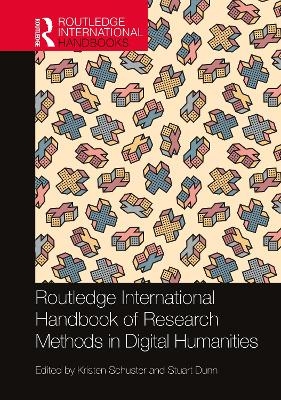
Routledge International Handbook of Research Methods in Digital Humanities
Routledge (Verlag)
978-1-138-36302-1 (ISBN)
This book draws on both traditional and emerging fields of study to consider consider what a grounded definition of quantitative and qualitative research in the Digital Humanities (DH) might mean; which areas DH can fruitfully draw on in order to foster and develop that understanding; where we can see those methods applied; and what the future directions of research methods in Digital Humanities might look like.
Schuster and Dunn map a wide-ranging DH research methodology by drawing on both ‘traditional’ fields of DH study such as text, historical sources, museums and manuscripts, and innovative areas in research production, such as knowledge and technology, digital culture and society and history of network technologies. Featuring global contributions from scholars in the United Kingdom, the United States, Europe and Australia, this book draws together a range of disciplinary perspectives to explore the exciting developments offered by this fast-evolving field.
Routledge International Handbook of Research Methods in Digital Humanities is essential reading for anyone who teaches, researches or studies Digital Humanities or related subjects.
Kristen Schuster is Lecturer in Digital Humanities, King’s College London. Stuart Dunn is Senior Lecturer in Digital Humanities at King's College London. He is also a Visiting Scholar in Stanford University's Center for Spatial and Textual Analysis's Spatial History project.
Section I: Computation and Connection
Creative practices
Get some perspective: Using physical objects in the Glucksman gallery to capture interdisciplinary stories of online teaching and learning
Digital Aptitude: Finding the right questions for dance studies
(Critical) artistic research and DH
Networks
"A picture paints a thousand words" – Hand-drawn network maps as a means to elicit data on digitally mediated social relations
Multi-sited ethnography and digital migration research: methods and challenges
Modelling and networks in digital humanities
Organized data
Charting Cultural History through Historical Bibliometric Research: Methods; Concepts; Challenges; Results
Manage Your Data: Information Management Strategies for DH Practitioners
The Library in Digital Humanities: Interdisciplinary Approaches to Digital Materials
Section II: Convergence and Collaboration
Infrastructures
Humans in the Loop: Epistemology & Method in King's Digital Lab
The Warburg Iconographic Database: from relational tables to interoperable metadata
Information Communication Technologies, Infrastructure, and Research Methods in the Digital Humanities
Maps and languages
Mapping Socio-ecological Landscapes: Geovisualization as Method
GIS for language study
(Digital) research practices and research data: case studies in communities of Sociolinguistics and Environmental Humanities scholars
Ethics
Intellectual Property Guidelines for the Digital Humanities
What Ethics Can Offer the Digital Humanities and What the Digital Humanities Can Offer Ethics
Practicing Goodwill Ethics within Digital Research Methods
Section III: Remediation and Transmission
Text and beyond
Computational methods for semantic analysis of historical texts
Encoding and Analysis, and Encoding as Analysis, in Textual Editing
Opening the ‘black box’ of digital cultural heritage processes: feminist digital humanities and critical heritage studies
Pedagogies
How to Use Scalar in the Classroom
Discovering Digital Humanities Methods Through Pedagogy
Course Design in the Digital Humanities
Tools and environments
Crowdsourcing in cultural heritage: a practical guide to designing and running successful projects
E-Learning in the Digital Humanities: Leveraging the Internet for Scholarship, Teaching, and Learning
Eye Tracking for the Evaluation of Digital Tools and Environments: New Avenues for Research and Practice
| Erscheinungsdatum | 25.08.2020 |
|---|---|
| Zusatzinfo | 11 Tables, black and white; 21 Line drawings, black and white; 33 Halftones, black and white |
| Verlagsort | London |
| Sprache | englisch |
| Maße | 189 x 246 mm |
| Gewicht | 1038 g |
| Themenwelt | Sozialwissenschaften ► Kommunikation / Medien ► Buchhandel / Bibliothekswesen |
| ISBN-10 | 1-138-36302-2 / 1138363022 |
| ISBN-13 | 978-1-138-36302-1 / 9781138363021 |
| Zustand | Neuware |
| Haben Sie eine Frage zum Produkt? |
aus dem Bereich


